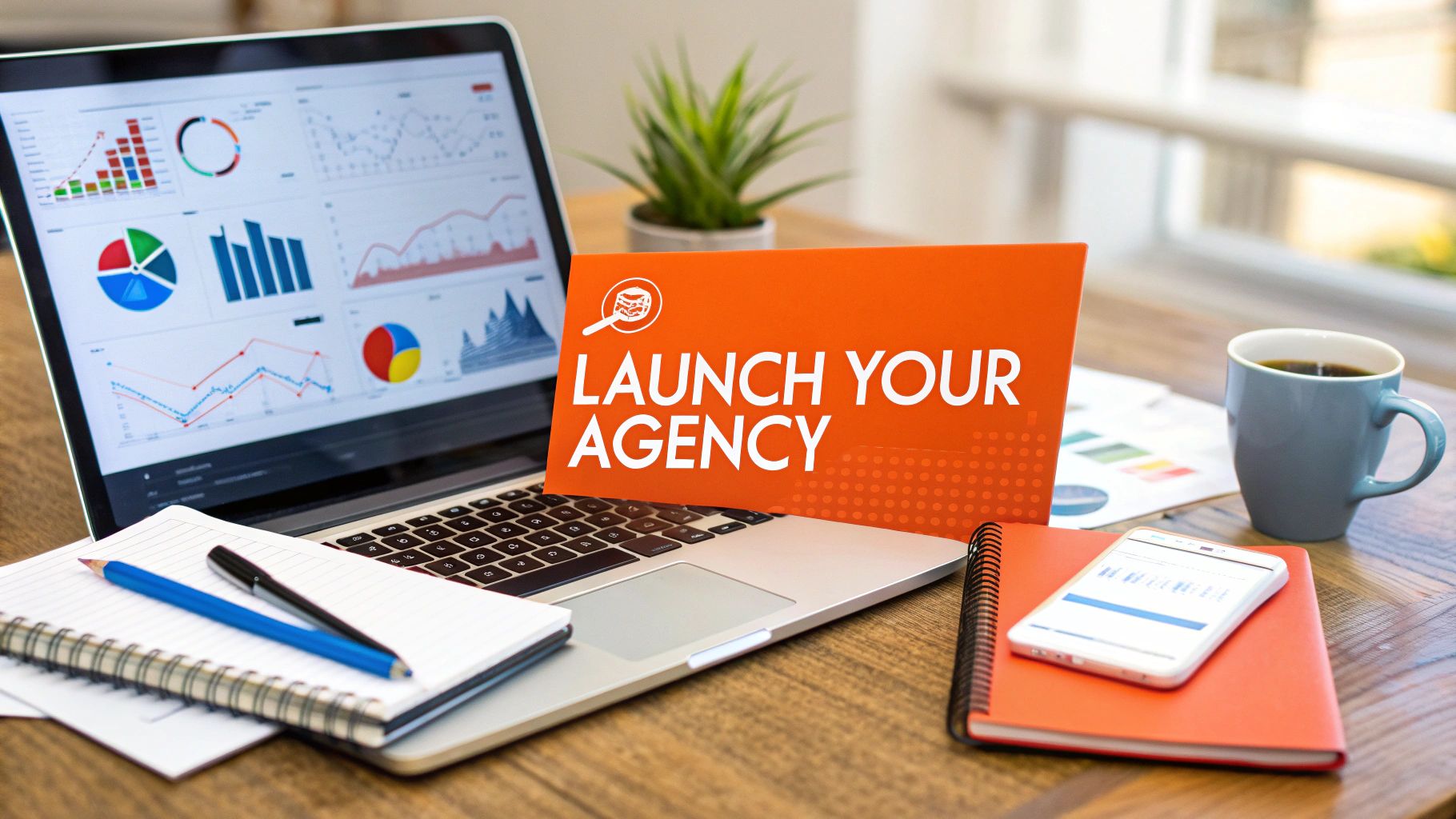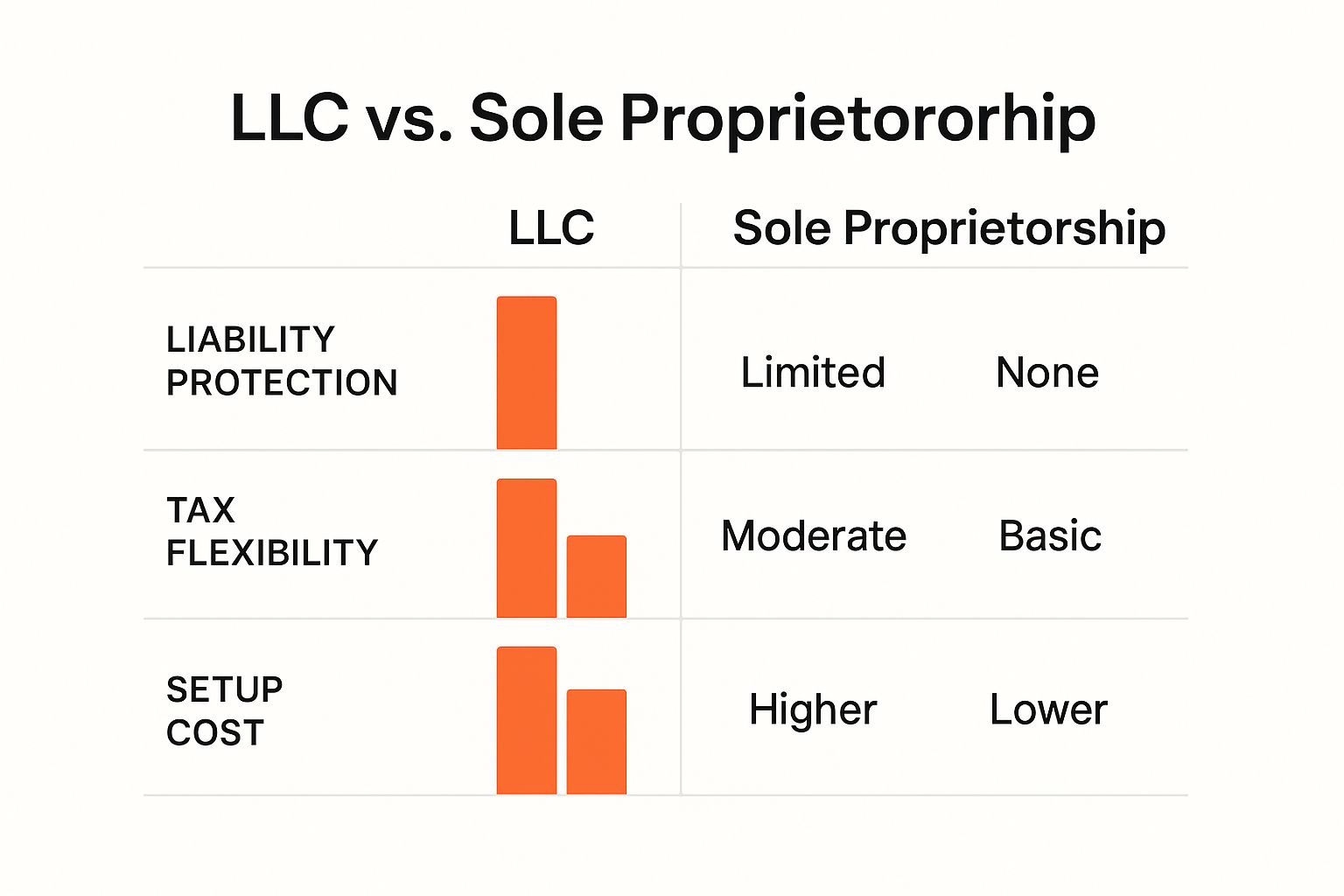
How to Start a Digital Marketing Agency in 60 Days | Step-by-Step Guide
Getting a new digital marketing agency off the ground really comes down to nailing four key things: defining a profitable niche, getting your legal and financial house in order, doing smart market research, and building a professional online presence. If you master these early on, you'll be building a credible business that can attract great clients right from the start.
Building Your Agency Foundation
Before you even think about landing those juicy six-figure retainers, you have to pour the concrete for your business. Honestly, this foundational stage is the most important part—it sets the entire trajectory for your agency's growth. Skipping these steps is like trying to build a skyscraper on sand; it's only a matter of time before it all comes crashing down.
Let's talk about how to find your place in an already crowded market and tackle the essential legal and financial grunt work.
The good news? The digital marketing world is absolutely booming. The global digital ad market hit around $667 billion recently and is on track to smash $1.5 trillion by 2030. Even with all that spending, nearly 47% of businesses are still flying blind without a real digital marketing plan. That’s a huge gap in the market just waiting for a focused, smart agency to fill it.
Find Your Profitable Niche
The single biggest mistake new agency owners make is trying to be everything to everyone. Calling yourself a "full-service" agency might sound impressive, but unless you have a massive team and an even bigger budget, it’s a fast track to burnout and delivering mediocre results.
The quickest path to profitability is to specialize.
A niche gives you focus. It makes your marketing ten times easier, your sales process smoother, and your service delivery way more efficient. You quickly become the go-to expert for a very specific problem, and that's what allows you to command premium prices.
Not sure how to niche down? Think about it in a few ways:
- By Industry: You could become the undisputed expert for a specific vertical, like dental practices, B2B SaaS companies, or local craft breweries. Practical Example: An agency that only does SEO for dentists can develop incredibly effective, repeatable campaigns that get real results. They can build a website that speaks directly to a dentist's pain points (e.g., "Get More Implant Patients") and use case studies from other dental clients.
- By Service: Master one high-demand service and become the best at it. Think Google Ads management, technical SEO audits, or even something as specific as Reddit marketing. Actionable Insight: If you specialize in email marketing automation, you can become an expert in platforms like Klaviyo or ActiveCampaign, offering a level of expertise a generalist agency can't match.
- By Audience: Zero in on a particular type of business. Maybe it's e-commerce brands on Shopify with over $1M in annual revenue or tech startups that have just closed their Series A funding round. This allows you to tailor your messaging to their specific growth stage.
Conduct Smart Market Research
Once you've got a niche in mind, you have to validate it. Don't just go with your gut. Use actual data to confirm that there’s real demand and a clear opportunity for you to stand out. The goal isn't just to spy on your competitors; it's to find the gaps they've left wide open.
Actionable Example: Let's say you're targeting local home service businesses (plumbers, electricians). Use a tool like Ahrefs or SEMrush to analyze the top-ranking agencies in that space. You might find they are great at SEO and PPC but their content is weak and generic. Boom. That's your entry point. A killer content strategy focused on hyper-local "how-to" guides for homeowners could become your unique selling proposition.
Key Takeaway: Your best clients aren't looking for a generalist. They're looking for a specialist who deeply understands their industry, their customers, and their unique challenges. Niching down is the fastest way to build that authority and trust.
Handle the Legal and Financial Setup
Alright, this is the part nobody loves, but it's completely non-negotiable if you want to build a real business. Getting the proper legal and financial structures in place protects you personally and makes you look credible to potential clients.
First up, choose a business structure. For most new agencies, it comes down to two options: a Sole Proprietorship or a Limited Liability Company (LLC). A sole proprietorship is easy and cheap to set up, but it offers zero personal liability protection. An LLC costs a bit more upfront but creates a legal wall between your personal assets and your business debts—a crucial safeguard you'll be glad to have.
This infographic breaks down the key differences between an LLC and a Sole Proprietorship.

As you can see, while a sole proprietorship might save you a few bucks initially, an LLC provides the kind of liability protection any serious business owner needs.
Actionable Insight: Register your business name, then immediately open a dedicated business bank account. Mixing your personal and business finances is a classic rookie mistake that leads to accounting nightmares and just looks unprofessional. Practical step: Use a service like Novo or Relay Financial, which offer online business checking accounts specifically designed for small businesses, making this process quick and painless.
Structuring Your Services and Pricing

Alright, you've got the foundation of your agency in place. Now comes the million-dollar question: what are you actually selling, and what’s it going to cost?
Many new agency owners make the classic mistake of trying to be everything to everyone. They create a massive menu of services, hoping that more options will mean more clients. But in my experience, the opposite is true. This "buffet" approach just leads to confused clients, shaky service quality, and a whole lot of operational headaches.
Don't be a jack-of-all-trades. Instead, get crystal clear on what you do best and package those strengths. If SEO is your superpower, build your packages around that. If you live and breathe PPC, create tiered offerings for Google Ads. This focus makes your value proposition incredibly clear, simplifies your sales pitch, and makes delivering your services a much smoother process.
Choosing the Right Pricing Model
There’s no magic bullet for pricing. The right model really depends on the kind of work you do and the type of relationship you want to have with your clients. Let's break down the three most common ways agencies charge for their work.
Picking the right pricing model is a crucial step for any digital marketing agency. It affects everything from your cash flow and client relationships to your long-term scalability. The table below compares the three most popular models to help you decide which one best suits your agency's services and business goals.
Comparison of Agency Pricing Models
| Model | Best For | Pros | Cons |
|---|---|---|---|
| Monthly Retainer | Ongoing services like SEO, content marketing, or social media management where clients need continuous support. | Creates predictable, recurring revenue. Fosters long-term client partnerships and allows for strategic planning. | Can lead to "scope creep" if boundaries aren't clear. Requires consistent value delivery to justify the monthly fee. |
| Project-Based Fee | One-off projects with a clear start and end, such as a website redesign, branding package, or a deep-dive SEO audit. | Provides cost certainty for the client and a clear scope for the agency. Payment is often tied to milestones. | Revenue is less predictable. Once the project is done, the income stream ends unless you secure another project. |
| Hourly Rate | Small, unpredictable tasks, quick consultations, or troubleshooting sessions. | Simple to understand and implement. Ensures you're paid for all the time you work. | Penalizes efficiency (the faster you work, the less you make). Can be difficult to scale and creates invoicing friction. |
Ultimately, many successful agencies use a hybrid approach. Practical Example: You might offer a monthly retainer for SEO management, but charge a project-based fee for an initial website technical audit. This gets your foot in the door with a defined project before upselling to a recurring contract.
It’s also worth noting how quickly things are changing. A recent survey of over 220 agency leaders revealed that 73% believe Generative AI has completely shaken up the search world, disrupting old-school SEO. This means your value has to go way beyond basic tasks. Agencies are adjusting their prices to reflect this, with 36% now charging between $175-$199 per hour and another 32% charging $200-$249.
How to Calculate Your Rates
Pricing is a blend of art and science. You have to cover your costs, make a healthy profit, and, most importantly, reflect the incredible value you bring to your clients. A huge mistake I see is agencies pricing based only on their time. You're not selling hours; you're selling outcomes.
A solid place to start is by figuring out your "Cost of Goods Sold" (COGS). This includes all the direct costs of getting the work done—things like software subscriptions (e.g., Ahrefs, Canva), freelance fees, and ad spend. Your price needs to comfortably cover all of that, with enough left over for overhead and profit.
To get a true handle on your numbers, using a good agency time tracking software can be a game-changer. It gives you real data on how profitable each project actually is.
Pro Tip: Don't get into a race to the bottom on price. There will always be someone willing to do it cheaper. Actionable Insight: When a prospect says your price is too high, reframe the conversation around value. Ask, "If this campaign brings you an extra $50,000 in revenue this year, is a $5,000 investment worth it?" Compete on ROI, not cost.
Creating Compelling Service Packages
Once you've landed on a pricing model, the next step is to bundle your services into simple, tiered packages. This makes it so much easier for clients to understand their options and for you to upsell them later. The classic "Good, Better, Best" model works wonders here.
Practical Example: An SEO agency's packages could look something like this:
- Growth Package (Good - $1,500/mo): This covers the fundamentals—keyword research for 20 terms, on-page SEO for 5 pages, and a basic monthly report. It’s perfect for a small business just getting its feet wet.
- Pro Package (Better - $3,000/mo): You get everything in the Growth package, but we add in monthly content creation (two 1,000-word blog posts) and manage their local SEO profiles (Google Business Profile optimization).
- Scale Package (Best - $5,500/mo): This is the all-in-one solution. It includes everything from the other two packages, plus a proactive link-building campaign (5 high-quality backlinks per month) and advanced analytics with a custom dashboard. This is for the client who's ready to dominate their market.
Each package should offer a clear step up in value, making the choice straightforward based on the client's budget and goals. Defining these packages isn't just about making a sale; it’s about positioning yourself as a strategic partner from the very first conversation.
Landing Your First High-Value Clients
Alright, you’ve got your services and pricing figured out. Now comes the real test: finding people who will actually pay you. Let’s be honest, landing those first few clients is the hardest part of this whole journey, but it’s also where the magic happens.
Your goal here isn't just to sign anyone with a pulse. You're hunting for high-value clients who see you as an expert. These are the people who will become the bedrock of your agency, providing the case studies and testimonials you need to build serious momentum.

Nail Your Online Presence (Without Overthinking It)
Before you start outreach, you need a professional home base online. Don't fall into the trap of thinking you need a massive, award-winning website that takes months to build. A clean, simple site that gets straight to the point is all you need to look credible.
Focus on these essentials for your starter site:
- A killer headline: It should speak directly to your ideal client. Think "Google Ads for E-commerce Brands That Drives Profitable Growth." No fluff.
- Your core services: Frame them as solutions. Instead of "SEO," say "Get Found by More Local Customers on Google."
- A real "About" page: Tell your story. Why did you start this? What makes you the right person for the job?
- A dead-simple contact form: Make it ridiculously easy for interested people to reach you.
"But I don't have a portfolio!" No problem. Make one. Practical Example: Create a "spec" project for a dream client in your niche. If you’re targeting local roofers, build a beautiful mock-up of a high-converting landing page in Canva or draft a sample 3-month content strategy. This shows you have the chops before you have the social proof.
Tap Into Your Network and LinkedIn
Your first client is probably closer than you think. They’re likely hiding in your existing network of old colleagues, friends, and professional contacts. Don’t be shy about letting people know what you’re building.
LinkedIn is your best friend here. Don't just post a generic "I've started an agency!" announcement. Instead, start giving away value. Share your genuine insights on your niche, leave thoughtful comments on posts from potential clients, and connect with people you admire in the space.
Actionable Tip: Tweak your LinkedIn headline. Ditch the generic "Digital Marketer." Get specific, like "SEO Specialist Helping B2B SaaS Startups Increase Organic Demo Requests." It immediately tells people who you are and what tangible outcome you help them achieve.
When you do reach out, send a personal message. Nobody wants another copy-paste sales pitch. Your goal is a real connection.
Try something like this:
"Hey [Name], I saw your post about [Topic] and loved your take on it. I’m focusing my new agency on helping [Your Niche] with [Your Service] and thought you might find that interesting. Open to a quick chat next week to trade some ideas?"
Master Cold Outreach (The Right Way)
Cold email gets a bad rap, but it works wonders when you don't act like a spammer. The whole game is about personalization and value. Mass-blasted, generic emails are a one-way ticket to the trash folder.
A well-crafted email campaign can be a serious growth engine. You can find deep-dive guides on https://redditagency.com/blog/email-marketing-and-lead-generation that cover building out a full pipeline.
To make your email actually get read, you have to prove you’ve done your homework.
Here’s a practical cold email template that doesn’t suck:
Subject: A quick thought on [Company Name]'s SEO
Hi [Prospect's Name],
I was digging into your website and saw you're putting out some great content on [Specific Topic]. Seriously good stuff.
I ran a quick analysis and spotted an opportunity to get more traffic your way by targeting keywords like "[Example Keyword 1]" and "[Example Keyword 2]." Given how strong your domain is, a few simple on-page tweaks to your existing blog posts could move the needle in a big way.
My agency is all about helping [Your Niche] do exactly that. If you’re curious, I’d be happy to jump on a 15-minute call next week to show you what I found. No strings attached.
Best,
[Your Name]
This approach works because it’s not about you—it’s about them. You’ve offered a specific, valuable insight that shows you invested time. Land a few clients this way, knock it out of the park, and you'll have all the social proof you need.
Building Systems for Smooth Operations
https://www.youtube.com/embed/LE2n7Aajsfg
Landing those first few clients is an incredible feeling. But the real test? Keeping them happy and delivering results month after month. That's where most new agency owners get tripped up.
The difference between a chaotic one-person show and a real, scalable agency comes down to one thing: systems. Without repeatable processes, you're just reinventing the wheel for every task and every client. That path leads straight to inconsistent work, missed deadlines, and clients who don't stick around.
Building a solid operational backbone isn't about creating corporate-style red tape. It’s about being smart and efficient so you can spend your time on what really matters—strategy and growth—instead of constantly putting out fires.
Create Standardized Workflows
The first thing you need to do is get everything out of your head and onto paper. Think through the entire client lifecycle, from the moment they sign on to the day you send their monthly report, and map out every single step.
This is what turns your expertise into a scalable process. Start by creating templates and checklists for these key areas:
- Client Onboarding: What exactly happens after a client signs the contract? Actionable Checklist: 1) Send welcome email with a link to book their kickoff call. 2) Send contract via Docusign. 3) Send invoice for first month's payment. 4) Grant access to a shared Slack channel. 5) Securely gather their logins using a tool like LastPass. A smooth start sets the tone for the whole relationship.
- Monthly Reporting: Don't just dump a bunch of analytics into an email. Build a report template that tells a story. Practical Structure: Section 1: Executive Summary (key wins & highlights). Section 2: Performance vs. Goals (show progress against KPIs). Section 3: What We Did This Month (list key tasks completed). Section 4: Plan for Next Month. This makes your report a strategic tool, not just a chore.
When you have these workflows documented, you eliminate the guesswork. More importantly, when you’re ready to hire, you can hand someone a proven playbook instead of trying to explain your methods from scratch.
A documented process is your agency's single source of truth. It ensures every client gets the same high-quality experience, whether they're your first or your fiftieth.
Your Essential Agency Toolkit
You don't need a mountain of expensive software to get started. In fact, a handful of well-chosen tools can do most of the heavy lifting, giving you a central hub for all your project management, communication, and reporting needs.
The right tech stack stops things from falling through the cracks and keeps everyone—your team and your clients—on the same page. Here’s a look at the essential toolkit I recommend for new agencies.
Essential Toolkit for a New Digital Marketing Agency
This table breaks down the core tools you'll need to run your agency efficiently, categorized by their main function.
| Category | Tool Example 1 | Tool Example 2 | Primary Function |
|---|---|---|---|
| Project Management | Asana | Trello | Assigning tasks, tracking deadlines, and visualizing project progress. |
| Team Communication | Slack | Microsoft Teams | Quick internal chats, file sharing, and reducing email clutter. |
| Client Reporting | Google Looker Studio | AgencyAnalytics | Creating visual, easy-to-understand performance dashboards. |
These platforms are more than enough to build a professional and organized operation from day one.
Knowing When to Delegate or Outsource
As you sign more clients, you're going to hit a wall. It's inevitable. Trying to do it all yourself is the fastest way to burn out, and the quality of your work will start to suffer. This is the critical moment when you have to start thinking about getting help.
First, identify the low-value, repetitive tasks that eat up your time but don't require your strategic brain. Think about things like scheduling social media posts, pulling basic data for reports, or formatting blog posts in WordPress.
Here are a couple of smart ways to get things off your plate:
- Hire a Virtual Assistant (VA): A good VA is a lifesaver. They can handle administrative work like managing your calendar and inbox or even preparing first drafts of client reports. Actionable Insight: This can easily free up 5-10 hours a week for you to focus on client strategy and sales calls—the activities that actually grow the business.
- Use Freelancers for Specialized Tasks: Let's say you're a PPC wizard and you land a client who also needs SEO. Don't try to fake it. Bring in a freelance SEO expert from a platform like Upwork or Toptal to handle that piece of the project. This lets you offer a wider range of services without ever compromising on quality.
The trick is to start delegating before you're drowning. By strategically outsourcing, you can keep the momentum going and grow your agency without becoming the bottleneck in your own business.
Scaling Your Agency for Long-Term Growth

You've done the hard part. Your systems are running, and you have a solid roster of happy clients. But this is a dangerous stage. It's incredibly easy to get trapped in the day-to-day client grind and stop growing.
If you want to build something truly sustainable, you have to make a mental shift—from working in your business to working on it.
Scaling isn’t about just getting more clients; it's about building a repeatable marketing engine that brings in predictable revenue. This means moving beyond founder-led sales and creating assets that attract ideal customers while you focus on steering the ship.
Leverage AI for Efficiency and Deeper Insights
One of the smartest ways to expand your capacity without immediately ballooning your payroll is to get serious about AI. These tools aren't a gimmick anymore; they’re essential for getting more done and delivering killer results.
Practical Example: Use a tool like Jasper or Copy.ai to generate first drafts for blog posts or social media content in minutes. This frees up your human talent to focus on high-level strategy and adding unique insights—the stuff that actually makes a difference. AI can also use tools like ChatGPT's Advanced Data Analysis to chew through massive datasets and spot customer behavior patterns you'd never see on your own.
There’s no ignoring the impact of AI. In fact, 71% of marketers are planning to invest at least $10 million into AI over the next three years. Agencies that master these tools now will be perfectly positioned to ride this wave. You can dig into more of these transformative marketing statistics to see just how fast things are changing.
Build Authority to Attract Your Ideal Clients
When you're starting out, you chase every lead. To scale, you need to flip that script and have clients start chasing you. The only way to do that is by establishing your agency as the authority in your niche.
This isn't about running more ads. It's about demonstrating your expertise so convincingly that ideal customers seek you out when they have a problem.
Here are a couple of practical ways to make that happen:
- Publish Original Industry Insights: Don't write another "10 SEO Tips" post. Instead, survey 50 of your industry contacts or analyze public data to create a unique report. Example: "The State of Google Ads for B2B SaaS in 2024" immediately makes you look like an expert, not just another agency.
- Host Educational Webinars: Pick a major pain point for your target audience and host a free webinar that solves it. Actionable Idea: A web design agency could run a session on "5 Common UX Mistakes on Shopify Stores That Are Costing You Sales." You'll generate high-quality leads who are already sold on your expertise before they even talk to you.
By consistently sharing valuable, original insights, you build an audience that trusts you. When they're ready to buy, your agency will be the first and only one they think of.
Forge Powerful Strategic Partnerships
You can't do it all alone, and you shouldn't try. One of the most overlooked growth hacks for agencies is building strategic partnerships. The concept is simple: find non-competing businesses that serve the exact same clients you do.
Think about it. If you're an SEO agency, who is already talking to your ideal customer?
- Web design and development firms
- PPC and paid media agencies
- Branding and creative studios
- Business coaches and consultants for your niche
A good partnership creates a two-way referral street. Practical Example: You can send your clients who need a new website to a trusted web design partner with confidence. In return, they’ll send a steady stream of new website owners who need SEO your way. It’s a powerful client acquisition channel that runs on trust, not ad spend.
Actionable Step: Don't just blast out a generic email. Identify 5 potential partners, study their work, and reach out with a personalized video message using a tool like Loom, explaining exactly how you can help each other. A simple invitation for a virtual coffee to talk shop is all it takes.
Common Questions About Starting an Agency
Even with the best-laid plans, actually taking the leap into agency ownership brings up a ton of questions. It's one thing to have a strategy on paper, but it's another thing entirely to deal with the day-to-day realities of running the show.
Let's dig into some of the most common questions I hear from founders who are just getting their feet wet. These are the practical, "what if" scenarios that tend to keep new agency owners up at night.
How Much Money Do I Really Need to Start?
This is always the first question, and the answer is probably a lot less than you think. You don't need a massive business loan or a huge injection of venture capital to get off the ground. In fact, many successful agencies are bootstrapped with initial costs somewhere in the $2,000 to $5,000 range.
What are you actually spending that money on?
- Legal Setup: Getting your business registered as an LLC will probably run you a few hundred dollars. It’s a necessary step to protect yourself.
- Website: A domain name (
$15/yr) and basic hosting on a platform like SiteGround ($50/yr) are cheap. A simple WordPress theme is all you need to look professional. - Essential Software: This is where you need to be smart. Get a project management tool (like the free version of Asana), a simple CRM to track leads (HubSpot's free CRM is excellent), and one core tool for your main service (like Ahrefs if you're doing SEO).
The name of the game is starting lean. Work from home to kill office costs, bring on freelancers before you even think about full-time hires, and only spend money on things that directly help you land and serve clients.
Should I Specialize or Be a Generalist?
Trying to be a "full-service" agency from day one is a classic mistake. It's a fast track to burnout and, frankly, delivering mediocre work. When you're just starting, specialization is your superpower.
Think about it. It's far easier to become known as the absolute best at one specific thing than it is to be just okay at ten different things.
Practical Example: Branding yourself as "the email marketing agency for DTC coffee brands" is infinitely more powerful than being another generic "digital marketing agency." This kind of focus sharpens your marketing, instantly builds trust with your ideal clients, and makes it a no-brainer for them to choose you. You can always broaden your services later, once you’ve built a solid reputation and have cash flow.
Don't fall into the trap of thinking more services equals more money. True expertise in a niche is what lets you charge premium prices and attract clients who are serious about results.
How Do I Handle a Difficult Client for the First Time?
Sooner or later, it's going to happen. You'll land a client who is overly demanding, never responds to emails, or questions every move you make. The trick is to manage the situation professionally without letting it crush your spirit.
Actionable Insight: First, always go back to the contract and the original scope of work. Most client issues stem from "scope creep"—when they start asking for things that weren't part of the deal. Practical script: "That's a great idea! It falls outside of our current scope, but I'd be happy to put together a separate proposal for that project for you." This politely and firmly resets expectations.
Next, document everything. If a client makes a request on a call, send a follow-up email confirming what was discussed. This creates a paper trail that prevents "he said, she said" arguments down the road.
And if the relationship just isn't working and is sucking up all your time and energy? It's perfectly okay to fire a client. Do it professionally, give them plenty of notice, and tie up any loose ends from your contract. Your sanity is worth more than any single retainer.
Ready to turn Reddit's massive audience into a predictable stream of leads and customers for your own agency or for your clients? Reddit Agency helps you build and execute strategies that drive real business results. Learn how we can help you grow at https://redditagency.com.